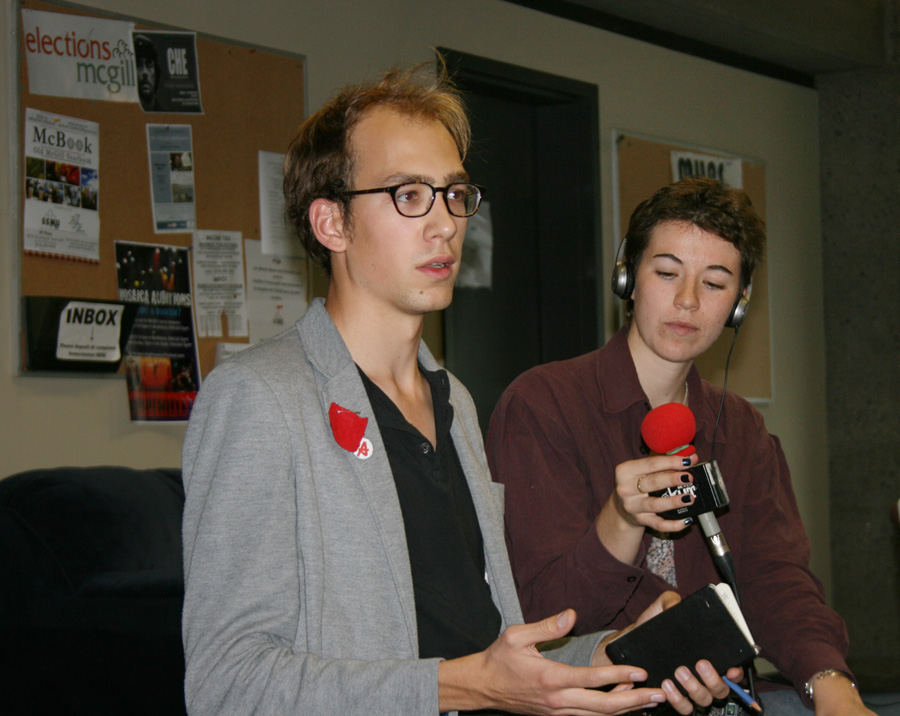On Sept. 18, students gathered in the Student Society of McGill University’s (SSMU) Clubs Lounge for an informal discussion about the recent student strikes in Quebec. The discussion was led by Jérémie Bédard-Wien, finance secretary of the Coalition large de l’Association pour une solidarité syndicale étudiante (CLASSE). CLASSE is one of Québec’s largest student union coalitions, and has played an active role in the student movement against the tuition increases planned by Jean Charest’s liberal government last year.
The 2011-2012 academic year was marked by months of large-scale student protests and strikes in response to the proposed tuition increase of $1,625 over a period of five years. Tuition for out-of-province and international students was also raised, as these tuition rates are based on the Quebec fee.
However, a minority Parti Québécois (PQ) government ousted Charest’s liberals in the Sept. 4 provincial election. On Sept. 20, the new government officially cancelled the tuition increase, and PQ leader Pauline Marois announced her intention to hold a summit on education in the upcoming months.
Last Tuesday’s discussion focused on how the student movement can continue to fight for free education and promote the interests of students, now that the general strikes have ended.
“I think that it’s very important for people to come and be part of this kind of conversation, because there are people who were affected in very different ways by the things that [happened] last semester,” SSMU Vice-President External Robin Reid-Fraser said.
Bédard-Wien stressed the importance of maintaining the atmosphere of student activism that grew during the months of demonstrations against the tuition increases. He also praised the “democratic union culture” that has appeared on anglophone campuses—an atmosphere in which students are able to participate through smaller student unions, like departmental associations.
Many of the attendees at Tuesday’s round-table were skeptical about the promises made by the newly elected government.
“The PQ has a long history of making promises they don’t keep, and [they] are certainly no friend of any progressive social struggle,” Bédard-Wien said. “We must still be prepared to face [a] hike.”
Discussion also focused on the proposed summit regarding Quebec education. It is currently unknown how students will be represented at the summit, and to what extent the interests and values of students will be taken into account.
“We want the summit to be something that involves [the] university community, rather than outside interests; [that] has proper representation for students; [and] that allows us to address governance and privatization,” Bédard-Wien said. “Of course, these demands are not likely to be met.”
Students expressed concern about the merits of the summit, and suggested possible plans of action, such as a refusal to take part or the possible creation of an alternate, student-organized summit.
“I think that those discussions about what we want the summit to look like shouldn’t start from the assumption that we are actually going to be at the summit,” Kevin Paul, first-year law student, said. “The forum will lose legitimacy if a large part of students don’t participate, and we can use that to demand certain things.”
Other topics of discussion included the importance of strengthening communications between student groups, workers’ unions, and other movements, as well as ways in which student groups can ensure the inclusion of out-of-province and international students.
According to Reid-Fraser, SSMU will likely hold similar events in the future to encourage continued awareness of current events amongst the McGill student body.
Bédard-Wien emphasized how the events of the past year show the power that students have to connect with and aid other political movements.
“This is the first time in many years that a mass movement organized on a union basis has managedto reach across to other movements, and to really engage with other sectors of society,” he said. “We must see strikes as a platform for other kinds of political action and debate to take place.”









